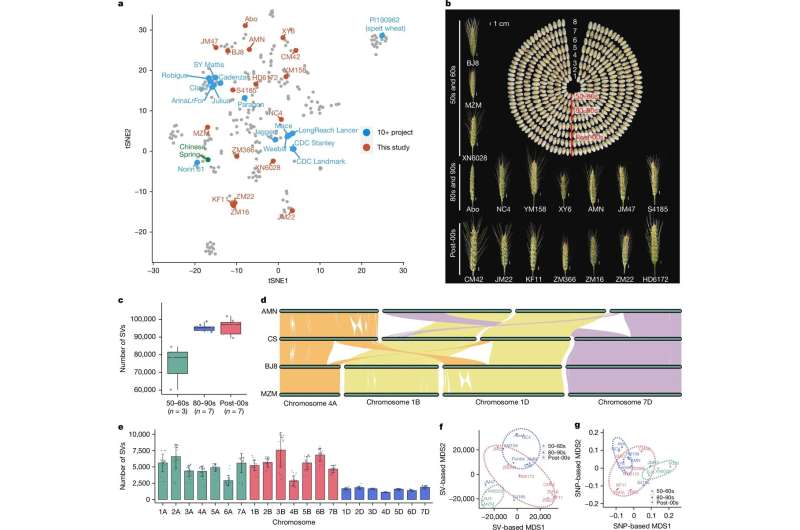
An international team of scientists from Australia and China has uncovered invaluable genetic and genomic information in the world's most comprehensive wheat genome sequencing and assembly project to date.
The study, published in Nature, answers vitally important questions on wheat's evolution and offers a springboard for future genome references and global breeding programs.
Co-led by scientists from the Centre for Crop and Food Innovation (CCFI) at Murdoch University, Chinese Academy of Agricultural Sciences (CAAS) and China Agricultural University (CAU), the four-year-long project culminated in the assembly of 17 reference-graded genomes of wheat, resulting in the identification of 250,000 structural variations that determine environmental adaptation, disease resistance, and dietary preference.
The exhaustive study, which includes representative wheat varieties from the past 70 years, has offered a wide array of insights ranging from wheat's influence on food habits and culture to new understandings of the wheat genome and how it evolved from a spring to winter crop.
Importantly, scientists have also pinpointed the genes responsible for novel disease resistance and environmental adaption, offering critical information that will ensure that breeding programs are fit for the future.
In a statement, co-lead of the study and Director of CCFI, Professor Rajeev Varshney, said, "This work, which has resulted in the most detailed source for wheat genetic and genomic information, offers fascinating insights into wheat's origins, its evolution, and its influence on human culture.
"For example, we've learned that wheat evolved from being a completely spring-grown crop to one that can thrive in winter, which answers a question that has stumped evolutionary researchers for years. From our findings, we can deduce that this shift is closely related to climate change over the last 100 years.
"We have also demonstrated that a genetic region that was once considered to be a 'dead zone' actually plays a very important role in variety differentiation. Our study has found that the accumulation of structural variations in the proximal region of the centromere significantly reduces the number of cross-recombinations between varieties, which will help accelerate the integration of superior genes found around centromeres."
Professor Xue Yong Zhang, study co-lead from CAAS said, "Another fascinating insight from this collaborative study is how the genes responsible for wheat hardness have directly influenced food habits and culture in China, such as preference and cooking practices."
Professor Varshney adds, "What really stands out as a vital resource of information—particularly for the Australian wheat industry—has been our findings on the 1RS chromosome. This chromosome, which contains important genes for the resistance of diseases such as powdery mildew and rust, is undergoing a process of rapid evolution, and understanding this dynamic change will be important in the creation of new varieties that can better withstand these devastating diseases."
Murdoch University Deputy Vice Chancellor Research and Innovation, Professor Peter Eastwood said, "We're immensely proud to have researchers at Murdoch University play a role in developing the most extensive source of genetic information for wheat. With 17 reference-grade genome assemblies and the identification of almost 250,000 structural variations, this research paves the way for better wheat varieties that can withstand pests and diseases while supporting global food security efforts."
Click here to see more...